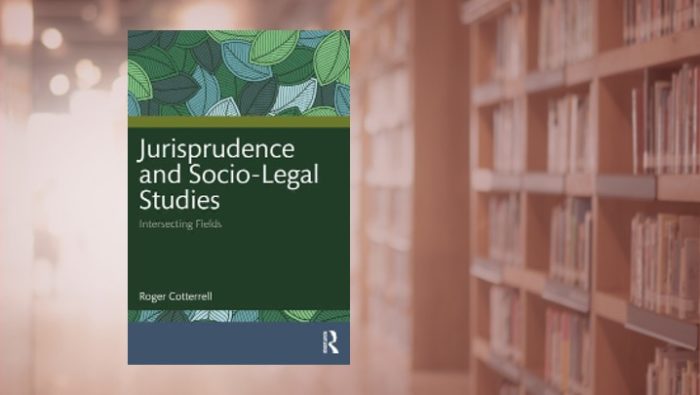
Why Care About Socio-Legal Theory?

For socio-legal scholars engaged in activism and supporting those on the front line of legally-sanctioned minoritisation, ‘doing theory’ can sometimes feel like an indulgence; a plaything of academics who do not need to engage in the real world where the exercise of power to ‘let die’ (if not to outright kill) is all too visible.
Yet, as the companion book to his 2018 Sociological Jurisprudence, Roger Cotterrell’s Jurisprudence and Socio-Legal Studies expertly sets out the case for why (and how) jurists should not only care about the wellbeing of the law, but specifically the theoretical underpinnings that sit at the interface of jurisprudence and social science. As a love letter to the theoretical study of law as a normative phenomenon, the Preface acknowledges that ‘[g]reat changes are occurring in law and society in many Western countries’ (p. xiii) which are making new demands on law, not only as a field of study but as a lived and living reality. Thus, those concerned (as we all should be) with the wellbeing of the law, the society, and the culture that the law ‘inhabits’ (p. 46) should, therefore, concern themselves with how the theoretical underpinnings of their field can support the law in responding to these changes.
The book comprises a selection of previously published but reworked essays, offering the opportunity to dip in and out or read the book in one sitting. It is split into three sections, with the first drawing on Cotterrell’s encyclopaedic knowledge of sociology and jurisprudence to build a rich yet accessible map delineating the evolution of jurisprudence, legal theory, philosophy of law, Socio-Legal Studies, legal sociology, and sociology of law which are carefully distinguished according to their historical, geographical and cultural contingencies. For those who engage with socio-legal theory at any level, this overview of the development of the field offers an essential point of entry for understanding not only what we do, but how and why.
Those familiar with Cotterrell’s previous work and his ‘networks of community’ lens will recognise here a masterclass in its application, demonstrating how the cultural, economic and political contingencies of law’s role in society can be teased out. Through this lens, for example, Cotterrell notes the stultifying effects of instrumentalism (including market logics) on our ability to acknowledge and engage with value questions in the law, noting that values ‘are typically subordinated to the formal rational qualities that dominate it’ (p. 41). Throughout numerous empirical examples, Cotterrell brings into dialogue a fuller panoply of (Weberian) interaction ideal types; not just the instrumental but the belief-based, traditional and affective to more fully understand law’s role in regulating and supporting the myriad complex and dynamic social relations that we can empirically observe (p. 47).
However, it is the second part of the book that perhaps offers the most pause for thought, as Cotterrell introduces us to four lesser-known (at least in the Anglophone jurists’ playbook) theorists of law and society. These are Leon Petrażycki (Chapter 7: The Jurist as Humanist Polymath), Eugene Ehrlich (Chapter 8: The Jurist as Legal Sociologist), Santi Romano (Chapter 9: Radical Legal Pluralism in the Shadow of Fascism), and Vilhelm Lundstedt (Chapter 10: A Functional Jurisprudence for the Welfare State). These case studies ‘from a different jurisprudential world’ (p. 9) offer ‘intriguing’ and ‘unusual’ ideas that, when interpreted in context, ‘might be seen as reaching out through time and beyond place’ to engage with the socio-legal ideas outlined in Part I. It is the historical, social, cultural and political context of their juristic writings that invites dialogue here, with conditions of rising social tensions, conflicting demands being made upon the law, fascism, and widespread social upheaval all contributing to original insights that can speak to modern dilemmas. In the process, the implication is that by revisiting earlier juristic writings, we might expand our socio-legal theoretical vocabulary by looking specifically outwards, responding ever more strongly to the split in legal scholarship of the 1960s that saw the dominance of HLA Hart’s linguistic philosophy-inspired jurisprudence that looked inwards to the internal logics of the law.
Part III of the book then turns to the historical, contemporary and potential future interfaces between law, jurisprudence and sociology, introducing yet more historical jurists including Hauriou and Duguit. Cotterrell’s expertise in these chapters brings together diverse theoretical traditions from the Weberian to the Foucauldian to the Luhmannian, offering a thematic analysis that allows us to enter into wider and deeper dialogue with each other; a relatively rare occurrence in modern socio-legal scholarship where the study of law, as ‘a tribal affair’, tends to partition discourse and theoretical inquiry into sub-fields and silos. Finally, in looking ahead, Cotterrell notes the importance of research-intensive university law schools as a cradle not only for the future wellbeing of socio-legal jurisprudence, but in turn, for its vital role in securing the future wellbeing of the law. In the light of the decimation of the higher education funding landscape, this is a call to arms for all of us who care about the discipline in which we have specialised as well as its essential cognates.
While Cotterrell has mentioned that this might be his final book – a fact that should spark regret in all of us who care deeply about his contributions to socio-legal theory – it offers not only an accessible point of entry and theoretical map for those less familiar with the terrain but offers pathways for closer dialogue between disparate theoretical traditions. As such, the book can easily be recommended as core reading for all of us who care about the wellbeing of the law in the light of the pressing threats to democracy, justice and equality that we are facing.

